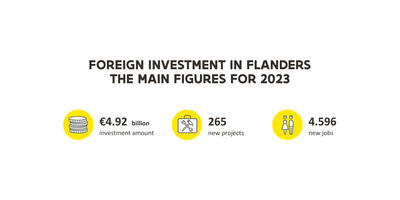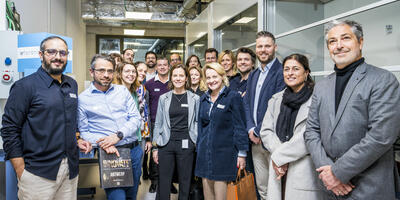
Agomab raises USD 100 million for promising fibrosis drug
Darling of biotech investors
Agomab has quickly become a darling of biotech investors. The company recently raised another USD 100 million or EU 95 million): the largest private investment round ever in Flanders’ biotech sector. This brings the capital raised since its inception to USD 240 million, a remarkable feat for a company barely six years old.
Based in Ghent (Flanders), Agomab develops medicine to stop organ damage caused by fibrosis: the formation of scar tissue by chronic inflammation. Previous rounds included pharma giants Pfizer and Boehringer Ingelheim, among others. This time, the deal is driven by Fidelity, one of the world’s largest investment funds.
“You don't close a deal like that overnight; it’s the result of years of maintaining close contact,” says Agomab CEO Tim Knotnerus. EQT Life Sciences, the largest biotech financier in Europe, is also taking part in the financing round, as is KKR, a major reference in the private equity world.
High medical need
Investors are mainly attracted by the promising science behind Agomab. Fibrosis is a medical field that’s relatively unexplored by pharma companies. The most advanced project is the search for a medicine to treat intestinal fibrosis in patients with Crohn’s disease. Agomab successfully concluded an initial study with healthy volunteers. It is now in full preparation for a phase 2 study, treating 36 patients.
While the study results will determine the company’s future, the American Food & Drug Administration has decided to give Agomab a pre-approval fast-track pass. This is a clear indicator of the high medical need. Half of all patients with Crohn's, a chronic inflammatory bowel disease, develop fibrosis to some degree, which causes the small intestine to narrow at the end.
Aiming ever higher
Agomab is confident its medicine can stop the fibrosis process. “This has been tried – in vain – by several pharmaceutical companies. There were always too many side effects. Our medicine is introduced into the intestines in pill form. Using a chemical trick, the active ingredient doesn’t enter the bloodstream, avoiding side effects elsewhere in the body.” Agomab will also apply this approach to pulmonary fibrosis, a deadly condition that affects 50,000 new patients worldwide each year.
Stopping the fibrosis process would already be a big step forward, but Agomab is aiming even higher. In the first patient study, Knotnerus also hopes to get an indication of whether the drug can repair organ damage. “That’s the holy grail,” he says. “Not everyone is convinced that it can, including some investors. We’ll have to wait and see. There is a risk involved in these investments, for sure. What we are trying to achieve is not incremental innovation, but breakthrough science.”
One of the potential Agomab drugs was developed using technology from Argenx, another successful Flanders-based biotech firm. Other research programs were brought in through Agomab’s acquisition of Origo Biopharma (Spain) several years ago.


